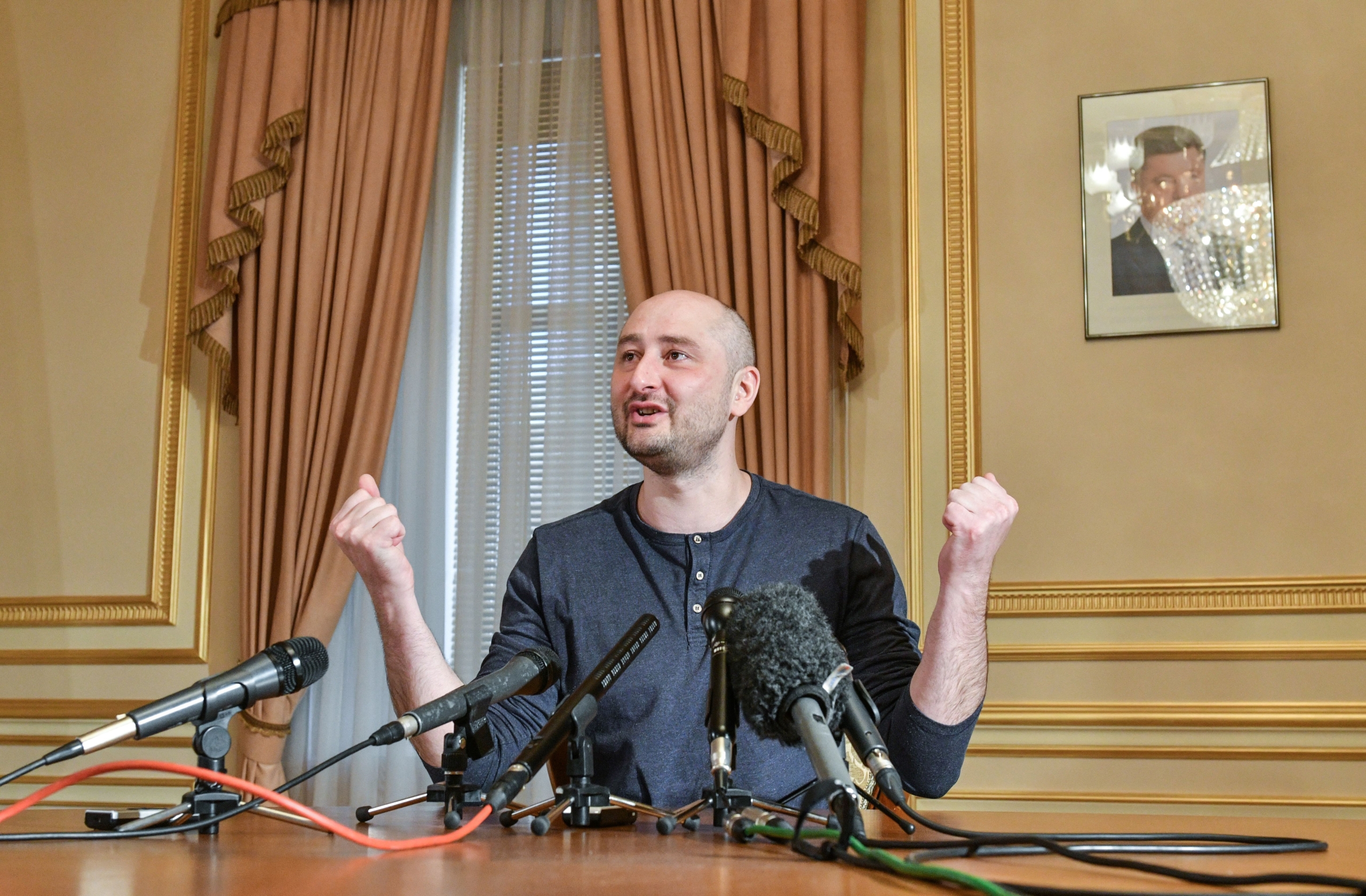He was a “martyr for the freedom of Russia and for peace in Ukraine” and “an outspoken critic of the Kremlin.” He was memorialized with flowers and photographs outside his apartment. He is, as you’ve probably heard by now, very much alive.
Arkady Babchenko, the dissident Russian journalist living in Ukraine, shocked his friends and colleagues by turning up yesterday at a press conference meant to update the investigation into his murder. He explained that he had faked his own death, with the help of the Security Service of Ukraine (SBU), in a Hollywood-style sting operation designed to capture those who really were out to get him. SBU claimed that Russian operatives plotted Babchenko’s assassination, and that they have a suspect in custody.
Babchenko’s reappearance was reportedly greeted with gasps and applause from journalists assembled at the press conference in Kiev. His return brought unexpected relief to those who mourned him, but it has also raised concerns from those worried that the manner in which the ruse was carried out will have lasting negative implications.
“This journalist’s reappearance is a great relief but it was distressing and regrettable that the Security Service of Ukraine played with the truth,” Reporters Without Borders secretary-general Christophe Deloire said in a statement. “Was such a scheme really necessary? There can be no grounds for faking a journalist’s death.”
The involvement of SBU in the case is especially troubling because the security service has faced disturbing questions about its possible involvement in the 2016 murder of Pavel Sheremet, a Belarusian journalist killed by a car bomb in central Kiev. Public trust in Ukrainian institutions, already low, is unlikely to be bolstered by deliberately false statements and a lack of transparency. SBU has not explained why such dramatic measures were necessary, nor has it identified the man it claims to have arrested in connection with the assassination plot.
There can be no grounds for faking a journalist’s death.
“This could have been a story about how, in all likelihood, Russian special services ordered the killing of a journalist in Kiev,” says Ilya Lozovsky, managing editor of the Organized Crime and Corruption Reporting Project, a multinational investigative consortium. “Instead, the narrative is about whether SBU is to be trusted. Are they just plunging us deeper into this universe where, to quote [Soviet-born British journalist] Peter Pomerantsev, ‘nothing is true and everything is possible’?”
There are concerns about how the Babchenko saga plays into the ongoing tensions between Russia and Ukraine, both over territory and control of information—and what a journalist was doing in the middle of an argument between two states. Immediately after reports of Babchenko’s death broke, Ukrainian Prime Minister Volodymyr Groysman blamed Russia in a post on Facebook. Once Babchenko reappeared, the Russian Foreign Ministry was quick to label the exercise as “anti-Russian provocation.” Lovosky worries that the actions of SBU and their failure so far to provide transparency about the case signal that Ukraine is headed down a perilous path. “Obviously, everybody is glad that [Babchenko] is alive,” he says. “But Ukraine is fighting a war against an enemy that has weaponized misinformation, so it’s disturbing to see them using the same tactics.”
RELATED: Tracking a journalist’s killer
RT, the Russian state-funded media outlet, quickly jumped at the chance to compare Babchenko’s faked murder with the poisoning of defected Russian spy Sergei Skripal. The British government has blamed the Kremlin for that attack, but Moscow has denied any involvement, using its propaganda channels to spread several conspiracy theories about who was responsible. The revelation of an actual conspiracy, in which a foreign government blamed Russia for a murder that didn’t occur, will undoubtedly be used to discredit future accusations against the Kremlin.
The case has already heightened diplomatic tensions between Moscow and Kiev, and press freedom groups have been left grasping for answers. The Committee to Protect Journalists, which condemned the apparent assassination on Tuesday, produced a list of questions following Babchenko’s shocking reappearance, and calling on Ukraine’s government to be more forthcoming with information. “We are greatly relieved that Babchenko is alive,” CPJ’s Nina Ognianova wrote. “At the same time, this extreme action by the Ukrainian authorities has the potential to undermine public trust in journalists and to mute outrage when they are killed.”
That a journalist reported killed is alive is obviously cause for celebration. But the concerns of press freedom groups aren’t unfounded. “If this does allow [SBU] to find definitive proof that Russian special services are behind this, then you could argue that it was worth it,” OCCRP’s Lozovsky says. “But the damage to public trust of Ukrainian institutions, to journalism, to credibility, to this whole environment that we’re in, is very serious and needs to be taken into account. “
Babchenko has apparently heard the concerns about the operation that he participated in, asking a valid question of those who have questioned his actions. “Everyone who says this undermines trusts in journalists: what would you do in my place, if they came to you and said there is a hit out on you?” Babchenko said, according to Reuters.
ICYMI: Freelancing abroad in a world obsessed with Trump
Pete Vernon is a former CJR staff writer. Follow him on Twitter @ByPeteVernon.

